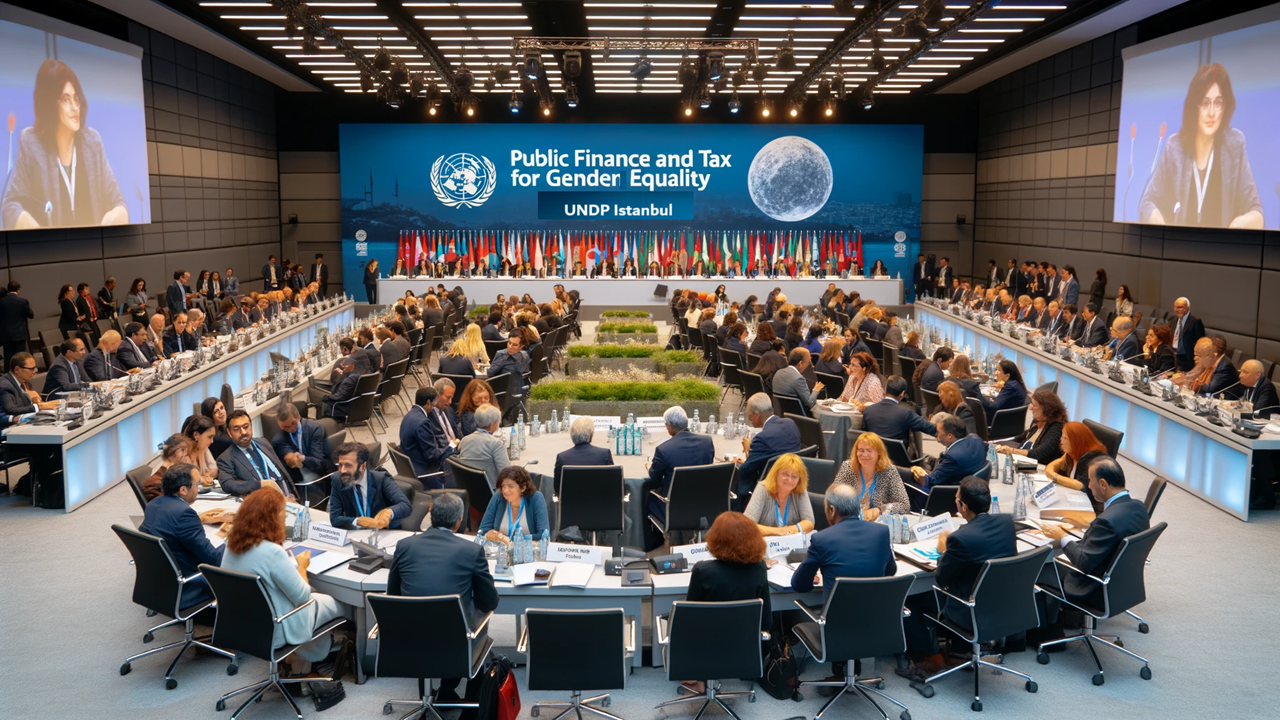Transforming Fiscal Policies for Gender Equality: Insights from the First UNDP Global Dialogue
The first UNDP Global Dialogue on Public Finance and Tax for Gender Equality highlighted the critical link between fiscal policies and gender equality. Key discussions emphasized the need for comprehensive reforms, enhanced technical capacity, and inclusive governance. UNDP's next steps include expanding the EQUANOMICS program, mobilizing resources, providing technical support, and building capacities to ensure fiscal policies contribute to gender equality and sustainable development goals.

In February 2024, Istanbul played host to a groundbreaking event – the first UNDP Global Dialogue on Public Finance and Tax for Gender Equality. This pivotal conference, part of the EQUANOMICS initiative and the Tax4SDGs Program, was supported by the Hewlett Foundation and the Governments of Norway and Finland. It gathered over 180 participants from nearly 50 countries, including high-ranking government officials, policymakers, civil society representatives, and academics. The event aimed to deepen understanding, share experiences, and chart concrete actions for embedding gender equality into fiscal policies.
The Critical Role of Public Finance in Gender Equality
Public finance profoundly impacts societal welfare by dictating how resources are generated and spent. Given existing gender disparities, fiscal decisions uniquely affect women and men. Effective public finance is essential for achieving the Sustainable Development Goals (SDGs), particularly gender equality. Unfortunately, gender equality has been historically underfunded, with an estimated additional $360 billion required annually to meet SDG targets. Thus, fiscal reforms must prioritize gender equality to align economic objectives with inclusive, sustainable outcomes.
Key Discussions and Findings from the Global Dialogue
1. Fiscal Policies as Drivers of Sustainable Development: Fiscal policies are pivotal for achieving gender equality and can significantly reduce poverty while redistributing wealth. A gender-focused approach enhances the effectiveness of public finance and tax reforms. This approach includes improving cross-departmental communication, adapting tax services to gender realities, and fostering diverse leadership.
2. Aligning Fiscal Objectives with the SDGs: Current fiscal objectives often misalign with SDGs and gender equality. Integrating gender equality into fiscal policies requires particular attention to informality and care economy organization. Gender equality must be central in performance-based budgeting reforms to ensure sustainable development.
3. Integrated Analysis of Revenue and Expenditure: Understanding the impact of fiscal policies on gender requires a comprehensive analysis of revenue and expenditure together. Countries like Gabon, Nigeria, and Malawi have demonstrated efforts to embed gender considerations into budget allocation and debt management, highlighting the importance of an integrated approach.
4. The Need for Institutional and Political Will: While there is strong political and institutional will, there remains a need for enhanced awareness and technical capacity, particularly in tax and fiscal incidence analysis. Comprehensive institutional reforms are essential for promoting gender-responsive fiscal policies. These reforms should include senior leadership commitments and a supportive organizational culture.
5. Addressing Data Gaps and Conducting Gender Impact Analyses: There is insufficient understanding of fiscal policies' impacts on the poorest and gender-differentiated effects. Addressing data gaps and better utilizing existing data, such as the gender of taxpayers, are crucial steps. Improved gender analysis of existing data on income distribution, household structures, consumption patterns, tax compliance, and economic behavior is necessary for informed policy-making.
6. Implementing a Gender Equality Perspective in Tax Systems: Analyzing tax systems from a gender perspective can help reduce inequality, simplify tax systems, and increase revenue. Key areas include tax progressivity, wealth taxes, and the taxation of informal workers. Critical analyses highlighted by participants include mid-term revenue strategies, biases in taxes and tax expenditures, and the incidence of taxes on women and men.
7. Promoting Inclusive Governance and Civil Society Engagement: Inclusive governance structures that engage civil society are vital for achieving consensus and holding governments accountable. National policy dialogues can help place fiscal reforms on political agendas, ensuring that political and social consensus is as important as technical support.
Next Steps and Concrete Actions
1. Expanding the EQUANOMICS Global Program: UNDP is set to expand the EQUANOMICS program to provide tools and data for transforming fiscal policies and tax systems. This expansion aims to equip institutions for reforms and promote cross-country collaboration.
2. Mobilizing Resources for Gender Equality Reforms: UNDP is engaging with development partners to support countries in implementing gender equality reforms. This includes mobilizing resources to ensure the successful implementation of planned reforms.
3. Providing Technical Support for Fiscal Policy Reforms: UNDP is offering technical support to countries undertaking fiscal policy and tax reforms. Many countries have already initiated gender-responsive budgeting and tax policy analysis, with UNDP's assistance playing a crucial role.
4. Building Capacities and Raising Awareness: UNDP is focused on developing the capacities of ministries of finance, tax administrations, and UNDP colleagues. Initiatives like the EQUANOMICS Global Learning Lab aim to build awareness and skills necessary for integrating gender equality into fiscal policies.
The UNDP Global Dialogue on Public Finance and Tax for Gender Equality underscored the critical link between public finance and gender equality. It highlighted the need for comprehensive reforms, enhanced technical capacity, and inclusive governance to ensure fiscal policies contribute to achieving gender equality and sustainable development goals. The outcomes and proposed actions from this dialogue are set to pave the way for significant progress in embedding gender equality into fiscal policies worldwide.
- FIRST PUBLISHED IN:
- Devdiscourse
ALSO READ
Tragic Shooting Incident Rocks Mukundpur
Limpopo Secures R120 Billion in Investment Pledges to Fuel Job Creation and Sustainable Development
UNDP Launches Free E-learning Course on Sustainable Finance for Climate and Energy at COP29 in Azerbaijan
Severe Socioeconomic Impacts of War on Urban Households in Sudan Revealed by UNDP-IFPRI Study
U.S. Budget Deficit Soars: Key Factors and New Fiscal Policies









